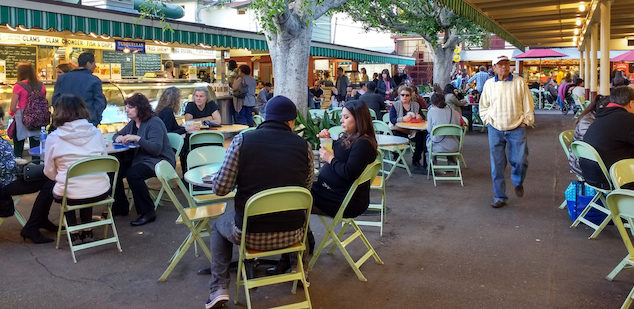Opinion
Labor-backed bill would devastate California restaurant industry
 Pre-pandemic customers at a restaurant in LA's Famers Market. (Photo: Alex Millauer, via Shutterstock)
Pre-pandemic customers at a restaurant in LA's Famers Market. (Photo: Alex Millauer, via Shutterstock)On June 3, the so-called “FAST Recovery Act” failed to secure enough votes to move forward in the California Legislature. Even though it was proposed by the chair of the Appropriations Committee and was a priority for labor interests, lawmakers recognized the damage that would have been caused by this bill.
The legislation, which is all but certain to return next session, would upend California’s restaurant industry and how California deals with fundamental workplace issues.
Over the last three decades, California has methodically built one of the most rigorous worker protection and workplace safety structures in the country, if not the world. Worker protections and safety laws fill thousands of codes and pages in regulatory registers, each addition undergoing exhaustive debate, public hearings, and input from experts and career civil servants from state agencies tasked with assuring workplace standards and protections.
In four steps, the bill, AB 257 by Assemblymember Lorena Gonzalez (D-San Diego), changes this certainty, spelling disaster for restaurants, small businesses, and their employees.
First, AB 257, sponsored by the Service Employees International Union, sets aside existing labor laws, in favor of a new set of rules that will be developed and enforced by 11 unelected political appointees. AB 257 envisions a new, independent regulatory “council” with unprecedented authority to draft and enact workplace rules, free of meaningful oversight by legislators or the governor.
This council will have the authority to “issue, amend or repeal any other rules and regulations”. In the event this council issues a rule that conflicts with one issued by a state agency, the state agency’s rule “shall not have the force and effect.”
Second, AB 257 creates another layer of local unelected councils. The bill would authorize a county and a city with a population greater than 200,000 to establish a Local Fast Food Sector Council to provide recommendations to the state fast food council. This will create so many potential conflicts and pitfalls that it is all but impossible to chart out.
Third, AB 257 creates a model to apply an unelected council to other California businesses. Every business owner, big and small, restaurant or not, should be concerned about this bill because you are next. The supporters claim this only will apply to “fast food” restaurants. In reality, it captures a much wider swath of the restaurant industry. And while this bill initially targets the restaurant industry, the precedent established in AB 257 will quickly spread to other sectors of the California economy.
Fourth, AB 257 changes a franchising model that helped countless entrepreneurs. The bill requires franchisors to strip franchisees of autonomy and reduce franchisees from independent business owners to corporate middle managers, seriously restricting new entrepreneurs who want to be in business for themselves but not by themselves, and benefit from a brand that is already known to the public. It’s worth noting that 60% of California restaurants are owned by people of color. Restaurant franchises are also well known for providing opportunities to women, the LGBTQ+ community, and new immigrant business owners.
Though the legislation may be reintroduced in January, the restaurant industry is well positioned and justified to put up a vigorous fight.
Restaurants have endured a prolonged period of unique challenges presented by the pandemic. Even in the worst of the COVID-era, California restaurants complied with regulations and demonstrated how an industry can safely open and maintain operations. California restaurants throughout COVID have shown to have fewer outbreaks and cases than many other major sectors, including retail trade and manufacturing.
Now as the restaurant industry attempts to climb out of the greatest crisis in our industry’s history, state policy makers should continue to help small businesses by removing debris from the long runway to recovery, not adding to it.
—
Editor’s Note: Jot Condie is president and CEO of the California Restaurant Association.
Want to see more stories like this? Sign up for The Roundup, the free daily newsletter about California politics from the editors of Capitol Weekly. Stay up to date on the news you need to know.
Sign up below, then look for a confirmation email in your inbox.

Leave a Reply